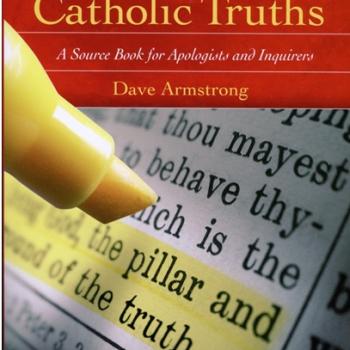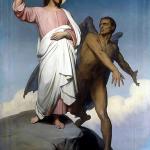At least three of the five scholars cited below are prominent Calvinists, and the other two are evangelical Protestants of some sort, as far as I can tell (Philip Schaff being one). Thus far, I have taken my definition of supralapsarianism from prominent Presbyterian (Calvinist) theologian Charles Hodge, and have backed up my contention that the “Reformers” held to double predestination. Calvin himself shall be cited in in conclusion:
According to Dr. Dijk the two views under consideration were in their original form simply a difference of opinion respecting the question, whether the fall of man was also included in the divine decree. Was the first sin of man, constituting his fall, predestinated, or was this merely the object of divine foreknowledge? In their original form, Supralapsarianism held the former, and Infralapsarianism, the latter. In this sense of the word CALVIN WAS CLEARLY A SUPRALAPSARIAN.
(Louis Berkhof, Systematic Theology, Grand Rapids, Michigan: Eerdmans, 4th rev. ed., 1949, 118)
Only in the later DEVELOPMENT of the doctrine of election the element of succession began to play an important part.
Originally it was a matter of different interpretations of the relationship between predestination and the fall. The question arose whether in the counsel of God the fall of man had been willed by Him. According to Dijk, two different answers were given: the answer of Luther, Zwingli and CALVIN, who all taught that the fall was comprised in the counsel of God, and the answer of Bullinger, who did not dare to go that far, but wanted to speak only of ‘praescientia’ . . .
According to the first view, rejection was ultimately based on the good pleasure of God, while according to the second view it was primarily connected with sin (‘praevisio peccati’). ‘And this,’ says Dijk, ‘is the fundamental difference between SUPRA and infra.’ He calls the view according to which the problem is a matter of succession ‘incomplete.’ Bullinger, as a representative of the original INFRA position, saw rejection as an act of God’s justice against sin, which therefore preceded the ‘justitia,’ and upon which the divine answer of the ‘justitia’ followed. This shows clearly that the relation between predestination and the fall is at stake . . .
Dijk writes: ‘Although THE SUPRA PRESENTATION IS THE ONE OF THE REFORMATION, no one will maintain that the infra presentation is contrary to Calvin’s teachings.
(Gerritt Berkouwer, Divine Election, tr. Hugo Bekker, Grand Rapids, Michigan: Eerdmans, 1960, 257, 260-61)
Presbyterian Calvinism is best represented by the theological systems of Charles Hodge, W.G.T. Shedd, and Henry B. Smith . . . they DISSENT from Calvin’s views by their INFRALAPSARIANISM . . . CALVIN was claimed by both schools. HE MUST BE CLASSED RATHER WITH THE SUPRALAPSARIANS, like Beza, Gomarus, Twysse, and Emmons. He saw the inconsistency of exempting from the divine foreordination the most important event in history, which involved the whole race in ruin. ‘It is not absurd,’ he says, ‘to assert that God not only foresaw, but also foreordained the fall of Adam and the ruin of his posterity.’ He expressly rejects the distinction between permission (‘permissio’) and volition (‘voluntas’) in God, who cannot permit what he does not will. ‘What reason,’ he asks, ‘shall we assign for God’s permitting the destruction of the impious, but because it is his will?’ [Inst., III, 23, 7-8] . . .
In ‘Inst.’ III, ch. XXIV. 12, Calvin uses STRONG SUPRALAPSARIAN LANGUAGE [this will be cited below] . . . In the ‘Consensus Genevensis’ (Niemeyer, p.251), he says that the fall was ordained by the admirable counsel of God (‘admirabili Dei consilio fuisse ordinatum’). BEZA UNDERSTOOD CALVIN CORRECTLY.
(Philip Schaff, History of the Christian Church, Vol. 8, Grand Rapids, Michigan: Eerdmans, 3rd rev. ed., 1910, 544, 553-554)
The reprobate like the elect [i.e., acc. to Calvin] are appointed to be so by the secret counsel of God’s will and by nothing else (Instit, II. xxii. 11). Though their life justifies that will, their rejection is not determined originally because of their life. Rather the life is the outcome of the decree, the decree necessitating that the life should be such as justified it . . . .
Calvin . . . held that their fate was the direct immediate appointment of God, justified indeed by their life but not its necessary consequence . . . that doom was fixed from all eternity and nothing in them could transfer them to the contrary class any more than anything in the elect could result in their becoming reprobate . . .
Calvin was compelled to attribute this Fall also to the divine decree . . . It was not merely foreseen but deliberately foreordained . . .
Calvin himself, ever imbued with practical religious aims and dogmatic only when authorised by Scripture, seems to have given the question little definite thought. His position is certainly sufficiently undefined to allow of BOTH PARTIES claiming him as a sponsor for their view . . .
The Consensus Genevensis (1552) assumes the SUPRALAPSARIAN view, while the French Confession, of which Calvin was practically the author, is infralapsarian in affirming that God chose out of the universal corruption and damnation in which all men were submerged some to eternal life. Cunningham strongly asserts that the latter more truly represents the Reformer’s real opinion, YET IT WAS SIGNIFICANT THAT BEZA, WHO SO LARGELY ECHOED CALVIN, WAS A SUPRALAPSARIAN . . .
The Westminster Confession attempts a compromise on this as on so many points, assigning the Fall of Adam to a permissive decree, but nevertheless including it in the eternal purpose of God who ordered it for his own glory. It is highly probable that Calvin himself would have objected to such phraseology. He declined to accept the distinction between the permission of God and His volition, on the ground that God cannot permit what He does not will; to permit is for Him synonymous with willing.
Later scholastic Calvinists . . . tried to eliminate from the doctrine what was repulsive by stating it in a negative way, characterising God’s act as of the nature of a ‘praeteritio’ (passing over) or an ‘indebitae gratiae negatio’ (the denial of unmerited grace) in contradistinction from ‘praedamnatio’ or ‘debitae poenae destinatio’ (appointment to merited punishment) . . . This is the term adopted by the Westminster Confession . . . Calvin would again have declined to see any real distinction. To pass by the reprobate was equivalent to permitting them to suffer the merited penalty of their sins, and with God permission amounts to volition.
(A. Mitchell Hunter [New College, Edinburgh], The Teaching of Calvin, Westwood, New Jersey: Fleming H. Revell Co., 2nd rev. ed., 1950, 108-110, 119, 127-128)
Calvin goes beyond Augustine in his explicit assertion of double predestination, in which the reprobation of those not elected is a specific determination of God’s inscrutable will . . . He feels under obligation to close the door to the notion that anything happens otherwise than under the control of the divine will . . .
He is not content to confine the function of God’s will to his having ‘passed by’ the nonelect in bestowing his saving grace: the action of his will is not ‘preterition’ but ‘reprobation’ . . .
This passage briefly shows Calvin as FAVORING THE SUPRALAPSARIAN as opposed to the infralapsarian view of the decrees of God. The issue became controversial in the Netherlands shortly after Calvin’s death.
(John T. McNeill, editor of Calvin’s Institutes, from his own edition, tr. Ford Lewis Battles, Philadelphia: Westminster Press, 1960, Vol. 1, lviii-lix, 469)
The Calvin “passage” to which McNeill refers above is the following (II, 12, 5, v.1, p. 469):
Here, surely, the fall of Adam is not presupposed as preceding God’s decree in time; but it is what God determined before all ages that is shown, when he willed to heal the misery of mankind.
Other Calvin utterances which in my opinion lend themselves strongly to a supralapsarian interpretation include the following, from the same edition of the Institutes:
If, then, we cannot determine a reason why he vouchsafes mercy to his own, except that it so pleases him, neither shall we have any reason for rejecting others, other than his will. For when it is said that God hardens or shows mercy to whom he wills, men are warned by this to seek no cause outside his will . . .
Those whom God passes over, he condemns; and this he does for no other reason than that he wills to exclude them from the inheritance which he predestines for his own children . . .
we have by now been taught that hardening is in God’s hand and will, just as much as mercy is [Rom 9:14 ff.] . . . This plainly means that all those whom the Heavenly Father has not deigned to plant as sacred trees in his field are marked and intended for destruction . . . “God aroused Pharaoh [Rom 9:17]; then, ‘he hardens whom he pleases’ [Rom 9:18]. From this it follows that God’s secret plan is the cause of the hardening . . .
(III, 22, 11 / III, 23, 1, Vol. 2, 947-949)
It is not in itself likely that man brought destruction upon himself through himself, by God’s mere permission and without any ordaining. As if God did not establish the condition in which he wills the chief of his creatures to be! . . . Besides, their perdition depends upon the predestination of God in such a way that the cause and occasion of it are found in themselves . . .
Man falls according as God’s providence ordains, but he falls by his own fault.
(III, 23, 8, Vol. 2, 956-957)
In order to attain logical harmony, Calvin must adopt some notion of God’s permissive will. But Schaff, Hunter, and McNeill alike state above that Calvin declines to accept such a distinction. So he is left with a seeming severe inconsistency. Thus, infralapsarians have softened this very position by retreating somewhat to a “permissive” / preterition stance hardly different from the Catholic Thomistic and Tridentine understanding.
As God by the effectual working of his call to the elect perfects the salvation to which by his eternal plan he has destined them, so he has his judgments against the reprobate, by which he executes his plan for them. What of those, then, whom he created for dishonor in life and destruction in death, to become the instruments of his wrath and examples of his severity? . . .
The supreme Judge, then, makes way for his predestination when he leaves in blindness those whom he has once condemned and deprived of participation in his light.
(III, 24, 12, Vol. 2, 978-979)
Dr P. N. Archbald: the Minister of the Reformed Church of Masterton, who has recently completed his PhD thesis on Beza through the Westminster Theological Seminary in Philadelphia:
Mind you, there are places where Calvin sounds rather supralapsarian himself. The whole debate is difficult and complex. It is clear from Beza’s letter to Calvin that he raised questions that went further than Calvin down the supralapsarian road. What is not entirely clear to me is where Beza ended up. His published statements are rather ambiguous, in my opinion. But even if Beza did end up a fully-fledged supralapsarian, let us keep in mind that this view has always been considered acceptable in Reformed circles, even if it is not the majority opinion.
Herman Bavinck, History of the Doctrine of the Decree of Predestination:
The three Reformers: Luther, Zwingli, and Calvin, arrived at the supralapsarian view: election and reprobation are deeds of God’s sovereignty, logically preceding God’s decree concerning the fall. Nevertheless, Calvin often follows the infralapsarian reasoning . . .
. . . many Thomists, Alvarez, the Salmanticenses, Estius, Sylvius. etc., taught that negative reprobation precedes the fall and that it is purely an act of God’s sovereignty and good pleasure. Nevertheless, this supralapsarian reprobation was viewed as wholly negative, i.e., as God’s purpose not to elect certain individuals, to permit them to fall, and afterward to ordain them to everlasting punishment (positive reprobation). Essentially, Luther, Zwingli, Calvin, and all supralapsarian Reformed theologians never went beyond this point. They neither taught a “predestination unto sins” nor did they represent God as the author of sin, as is falsely charged by Roman Catholics, . . .
. . . all three Reformers arrived at the so-called supralapsarian view of the doctrine of predestination, according to which both election and reprobation are to be viewed as acts of God’s sovereignty, logically preceding God’s decree concerning the fall, sin, and redemption through Christ. But it is especially Calvin who often purposely refuses to go beyond the secondary causes of salvation and perdition, and therefore often reasons in an infralapsarian manner . . .
. . . when Pighius answers Calvin by objecting that according to the latter’s view there would have been in the divine mind a “distinction between elect and reprobate previous to the fall of man,” Calvin indeed answers that Pighius fails to distinguish between “proximate and remote causes,” that every reprobate must consider his own sin to be the direct cause of his perdition, and that the opposite view is handicapped with the same objections, he does not deny the validity of the conclusion drawn by Pighius: there is a “secret divine decree” anteceding the fall, The final and deepest cause of reprobation as well as of election is the will of God. Hence, with Calvin the supralansarian and infralapsarian representation alternates. This is also true of most of the later theologians who embraced supralapsarianism. They regard the supralapsarian view to be admissible they do not think of condemning infralapsarianism or of demanding that their view be embodied in the official confession of the church as the only standard of truth. They do not ask that their own view he substituted for the infralapsarian representation but they plead for actual recognition of both views . . .
. . . the Synod [of Dort] purposely refused to condemn supralapsarianism; for, various theologians, among whom were Calvin, Beza, Piscator, Perkins, Hommins, Bogerman, etc., had at times used strong expression; e.g., “that some men are created in order that they may be damned; that men viewed as innocent are reprobated or damned; that God hates men irrespective of sin; that men were predestinated unto sin; that God has need of man as a sinner; that God willed and brought about the fact that men sinned; that God acted insincerely in the calling of certain persons,” etc. At the conference held in the Hague the Remonstrants had made ready use of these expressions and of the difference between infra- and supralapsarianism; consequently, the members of the synod were intent on avoiding such “phrases that were too harsh.” But when the delegates from England, Bremen, and Hesse insisted that these expressions be condemned, the Synod refused to grant this request. In defence of this refusal Synod stated that Scripture also uses very strong expressions at times, that such phrases may have a much milder meaning when examined in their context than they appear to have when considered apart from their context, and that the responsibility for them rests with the respective authors.
12. “John Gill and the Charge of Hyper-Calvinism,” Baptist Quarterly, October 1995.
Hoad links Hyper-Calvinism closely with Supralapsarianism and seems to suggest that the one is a definition of the other. Whether Gill was a Superlapsarian or not, however, is irrelevant to the question of whether he was a Hyper-Calvinist or not. This is especially the case as many writers look upon Calvin as a Supralapsarian himself! Schaff dismisses the relevancy of such theory-building, nevertheless, he argues guardedly that because Calvin taught that the Fall cannot be excluded from God`s decrees and that it is futile to distinguish between what God wills and what God permits, Calvin “must be classed rather with the Supralapsarians .”
Louis Berkoff, in his standard work Systematic Theology, agrees fully with Schaff about the speculative nature of both terms. Berkoff, however, is prepared to state dogmatically that “Calvin was clearly a Supralapsarian .” He says this because of Calvin’s teaching that the Fall was included in the divine decrees. Thus rather than being “more Calvinistic than Calvin”, to use Naylor`s definition culled from Fuller, in the point of Supralapsarianism, if Gill were a Supralapsarian he would be quite “as Calvinistic as Calvin” and because of this could hardly be called a Hyper-Calvinist or even High-Calvinist.
Charles Hodge, Systematic Theology, PART III. Soteriology / CHAPTER I. The Plan of Salvation / 2. Supralapsarianism:
The position of Calvin himself as to this point has been disputed. As it was not in his day a special matter of discussion, certain passages may be quoted from his writings which favour the supralapsarian and other passages which favour the infralapsarian view. In the Consensus Genevensis, written by him, there is an explicit assertion of the infralapsarian doctrine.












